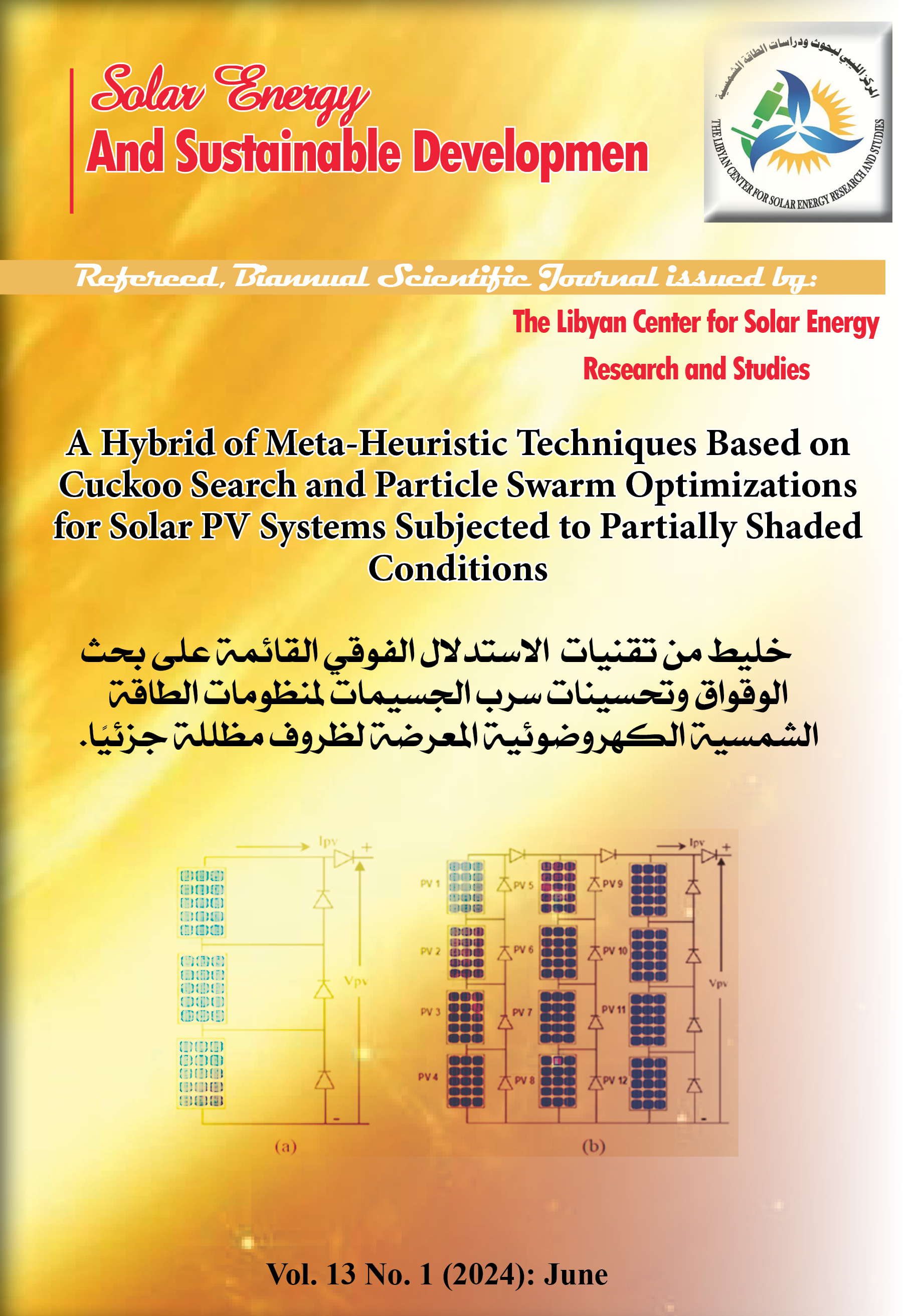A Hybrid of Meta-Heuristic Techniques Based on Cuckoo Search and Particle Swarm Optimizations for Solar PV Systems Subjected to Partially Shaded Conditions
DOI:
https://doi.org/10.51646/jsesd.v13i1.178الكلمات المفتاحية:
Cuckoo search (CS)، particle swarm optimization (PSO)، partial shading conditions (PSC).الملخص
Solar energy has a significant role in meeting rising energy demand while reducing environmental impact. Solar radiation and temperature are important factors on which PV energy production depends, but its optimal operation point is influenced by variations in the aforementioned environmental factors. The nonlinear behavior of the solar system and the variable nature of environmental conditions make determining the optimal operation point difficult. To overcome these difficulties, maximum power point tracking (MPPT) finding techniques are used to extract the optimal power from the photovoltaic energy system. The behavior of MPPT varies for different weather conditions, such as partial shading conditions (PSC), and uniform irradiance conditions. Conventional techniques are simple, quick, and efficient for tracing the MPP quickly, but they are limited to uniform weather conditions. In addition, these techniques don't achieve the Global Maxima (GM) and mostly stay stuck at the Local Maxima (LM). The Meta-Heuristic techniques aid in finding the GM, but their primary disadvantage is that they take a longer time to trace the Global Maxima. This study addresses the problem by combining Cuckoo Search (CS) and Particle Swarm Optimization (PSO) algorithms, leading to a hybrid (CSPSO) technique to extract the global maximum (GM). To verify the effectiveness of the suggested technique, its performance is examined under three different irradiance patterns for different PV array configurations (such as 3S and 4S3P) through MATLAB simulation. The outcomes of CSPSO are compared with the prior well-known Meta-Heuristic techniques such as Cuckoo Search (CS), Particle Swarm Optimization (PSO), and Crow Search Algorithm (CSA). The results show the suggested technique excels over other techniques in terms of accuracy, tracking efficiency, and tracking speed. The suggested technique is capable of tracking GMPP with an average efficiency of 99.925% and an average tracking time of 0.13 s in all shading patterns studied.
التنزيلات
المقاييس
المراجع
Y. Nassar, A. Alatrash, B. Ahmed, R. Elzer, A. Ahmed, I. Imbayah, A. Alsharif, M. Khaleel,, "Assessing the Viability of Solar and Wind Energy Technologies in Semi-Arid and Arid Regions: A Case Study of Libya's Climatic Conditions," Applied Solar Energy, vol. 1, 2024.
M. Khaleel, Z. Yusupov, N. Yasser, and H. J. El-Khozondar, "Enhancing Microgrid performance through hybrid energy storage system integration: ANFIS and GA approaches," Int. J. Electr. Eng. and Sustain., pp. 38-48, 2023.
A. Alsharif, A. A. Ahmed, M. Khaleel, Y. F. Nassar, M. A. Sharif, and H. J. El-Khozondar, "Power Management and Sizing Optimization for Isolated Systems Considering Solar, Battery, and Diesel Generator based on Cost and Reliability under Murzuq and Sabha Cities Weather," Power, vol. 28, p. 29th, 2023.
L. A. Rtemi, W. El-Osta, and A. Attaiep, "Hybrid system modeling for renewable energy sources," Journal of Solar Energy and Sustainable Development, vol. 12, 2023. DOI: https://doi.org/10.51646/jsesd.v12i1.146
H. J. El‐Khozondar, F. El‐batta, R. J. El‐Khozondar, Y. Nassar, M. Alramlawi, and S. Alsadi, "Standalone hybrid PV/wind/diesel‐electric generator system for a COVID‐19 quarantine center," Environmental Progress & Sustainable Energy, vol. 42, p. e14049, 2023. DOI: https://doi.org/10.1002/ep.14049
M. G. M. Almihat and M. Kahn, "Design and implementation of Hybrid Renewable energy (PV/Wind/Diesel/Battery) Microgrids for rural areas," Journal of Solar Energy and Sustainable Development, vol. 12, 2023. DOI: https://doi.org/10.51646/jsesd.v12i1.151
Y. F. Nassar, M. J. Abdunnabi, M. N. Sbeta, A. A. Hafez, K. A. Amer, A. Y. Ahmed, et al., "Dynamic analysis and sizing optimization of a pumped hydroelectric storage-integrated hybrid PV/Wind system: A case study," Energy conversion and management, vol. 229, p. 113744, 2021. DOI: https://doi.org/10.1016/j.enconman.2020.113744
Y. Aldali, K. Morad, N. Elminshawy, and F. Ahwide, "Numerical Simulation of the Integrated Solar/Hybrid Desalination System," Solar Energy and Sustainable Development Journal, vol. 6, pp. 42-54, 2017. DOI: https://doi.org/10.51646/jsesd.v6i2.47
A. A. Hafez, Y. F. Nassar, M. I. Hammdan, and S. Y. Alsadi, "Technical and economic feasibility of utility-scale solar energy conversion systems in Saudi Arabia," Iranian Journal of Science and Technology, Transactions of Electrical Engineering, vol. 44, pp. 213-225, 2020. DOI: https://doi.org/10.1007/s40998-019-00233-3
S. Y. Alsadi and Y. F. Nassar, "A general expression for the shadow geometry for fixed mode horizontal, step-like structure and inclined solar fields," Solar Energy, vol. 181, pp. 53-69, 2019. DOI: https://doi.org/10.1016/j.solener.2019.01.090
A. H. Almalih, M. A. Faraj, A. Nouh, and A. Almalih, "A comparative study of two meta-heuristic techniques for solar PV systems under partially shaded conditions," in 2023 IEEE 3rd International Maghreb Meeting of the Conference on Sciences and Techniques of Automatic Control and Computer Engineering (MI-STA), 2023, pp. 830-835. DOI: https://doi.org/10.1109/MI-STA57575.2023.10169334
M. A. Hafeez, A. Naeem, M. Akram, M. Y. Javed, A. B. Asghar, and Y. Wang, "A novel hybrid MPPT technique based on Harris hawk optimization (HHO) and perturb and observer (P&O) under partial and complex partial shading conditions," Energies, vol. 15, p. 5550, 2022. DOI: https://doi.org/10.3390/en15155550
A. F. Mirza, M. Mansoor, K. Zhan, and Q. Ling, "High-efficiency swarm intelligent maximum power point tracking control techniques for varying temperature and irradiance," Energy, vol. 228, p. 120602, 2021. DOI: https://doi.org/10.1016/j.energy.2021.120602
M. Mansoor, A. F. Mirza, and Q. Ling, "Harris hawk optimization based MPPT control for PV systems under partial shading conditions," Journal of Cleaner Production, vol. 274, p. 122857, 2020. DOI: https://doi.org/10.1016/j.jclepro.2020.122857
H. Abouadane, A. Fakkar, D. Sera, A. Lashab, S. Spataru, and T. Kerekes, "Multiple-power-sample based P&O MPPT for fast-changing irradiance conditions for a simple implementation," IEEE Journal of Photovoltaics, vol. 10, pp. 1481-1488, 2020. DOI: https://doi.org/10.1109/JPHOTOV.2020.3009781
S. A. Rizzo and G. Scelba, "ANN based MPPT method for rapidly variable shading conditions," Applied Energy, vol. 145, pp. 124-132, 2015. DOI: https://doi.org/10.1016/j.apenergy.2015.01.077
S. K. R. Moosavi, M. Mansoor, M. H. Zafar, N. M. Khan, A. F. Mirza, and N. Akhtar, "Highly efficient maximum power point tracking control technique for PV system under dynamic operating conditions," Energy Reports, vol. 8, pp. 13529-13543, 2022. DOI: https://doi.org/10.1016/j.egyr.2022.10.011
K. Ishaque, Z. Salam, M. Amjad, and S. Mekhilef, "An improved particle swarm optimization (PSO)–based MPPT for PV with reduced steady-state oscillation," IEEE transactions on Power Electronics, vol. 27, pp. 3627-3638, 2012. DOI: https://doi.org/10.1109/TPEL.2012.2185713
S. KT and B. Venugopal Reddy, "A novel constraint‐based improved equilibrium optimization for global peak tracking of photovoltaic system under complex shading conditions," International Journal of Circuit Theory and Applications, vol. 51, pp. 2819-2838, 2023. DOI: https://doi.org/10.1002/cta.3546
M. I. Mosaad, M. O. abed el-Raouf, M. A. Al-Ahmar, and F. A. Banakher, "Maximum power point tracking of PV system based cuckoo search algorithm; review and comparison," Energy procedia, vol. 162, pp. 117-126, 2019. DOI: https://doi.org/10.1016/j.egypro.2019.04.013
S. Mohanty, B. Subudhi, and P. K. Ray, "A new MPPT design using grey wolf optimization technique for photovoltaic system under partial shading conditions," IEEE Transactions on Sustainable Energy, vol. 7, pp. 181-188, 2015. DOI: https://doi.org/10.1109/TSTE.2015.2482120
A. soufyane Benyoucef, A. Chouder, K. Kara, and S. Silvestre, "Artificial bee colony-based algorithm for maximum power point tracking (MPPT) for PV systems operating under partial shaded conditions," Applied Soft Computing, vol. 32, pp. 38-48, 2015. DOI: https://doi.org/10.1016/j.asoc.2015.03.047
M. Mansoor, A. F. Mirza, Q. Ling, and M. Y. Javed, "Novel Grasshopper optimization based MPPT of PV systems for complex partial shading conditions," Solar Energy, vol. 198, pp. 499-518, 2020. DOI: https://doi.org/10.1016/j.solener.2020.01.070
D. Fares, M. Fathi, I. Shams, and S. Mekhilef, "A novel global MPPT technique based on squirrel search algorithm for PV module under partial shading conditions," Energy Conversion and Management, vol. 230, p. 113773, 2021. DOI: https://doi.org/10.1016/j.enconman.2020.113773
M. Y. Javed, A. F. Murtaza, Q. Ling, S. Qamar, and M. M. Gulzar, "A novel MPPT design using generalized pattern search for partial shading," Energy and Buildings, vol. 133, pp. 59-69, 2016. DOI: https://doi.org/10.1016/j.enbuild.2016.09.054
A. F. Mirza, M. Mansoor, Q. Ling, B. Yin, and M. Y. Javed, "A Salp-Swarm Optimization based MPPT technique for harvesting maximum energy from PV systems under partial shading conditions," Energy conversion and management, vol. 209, p. 112625, 2020. DOI: https://doi.org/10.1016/j.enconman.2020.112625
R. Chi, Y.-x. Su, D.-h. Zhang, X.-x. Chi, and H.-j. Zhang, "A hybridization of cuckoo search and particle swarm optimization for solving optimization problems," Neural Computing and Applications, vol. 31, pp. 653-670, 2019. DOI: https://doi.org/10.1007/s00521-017-3012-x
X.-S. Yang and S. Deb, "Cuckoo search via Lévy flights," in 2009 World congress on nature & biologically inspired computing (NaBIC), 2009, pp. 210-214. DOI: https://doi.org/10.1109/NABIC.2009.5393690
A. H. Almalih, M. A. Faraj, and A. Nouh, "Comparison Between Global MPPT Techniques for PV Array Systems Subjected to Different Partially Shaded Conditions," in 2022 IEEE 2nd International Maghreb Meeting of the Conference on Sciences and Techniques of Automatic Control and Computer Engineering (MI-STA), 2022, pp. 673-679. DOI: https://doi.org/10.1109/MI-STA54861.2022.9837668
H. Rezk, A. Fathy, and A. Y. Abdelaziz, "A comparison of different global MPPT techniques based on meta-heuristic algorithms for photovoltaic system subjected to partial shading conditions," Renewable and Sustainable Energy Reviews, vol. 74, pp. 377-386, 2017. DOI: https://doi.org/10.1016/j.rser.2017.02.051
J. Kennedy and R. Eberhart, "Particle swarm optimization," in Proceedings of ICNN'95-international conference on neural networks, 1995, pp. 1942-1948.
H. Rezk, A.-O. Mazen, M. R. Gomaa, M. A. Tolba, A. Fathy, M. A. Abdelkareem, et al., "A novel statistical performance evaluation of most modern optimization-based global MPPT techniques for partially shaded PV system," Renewable and Sustainable Energy Reviews, vol. 115, p. 109372, 2019. DOI: https://doi.org/10.1016/j.rser.2019.109372

التنزيلات
منشور
كيفية الاقتباس
إصدار
القسم
الرخصة
الحقوق الفكرية (c) 2024 Solar Energy and Sustainable Development Journal

هذا العمل مرخص بموجب Creative Commons Attribution-NonCommercial 4.0 International License.













